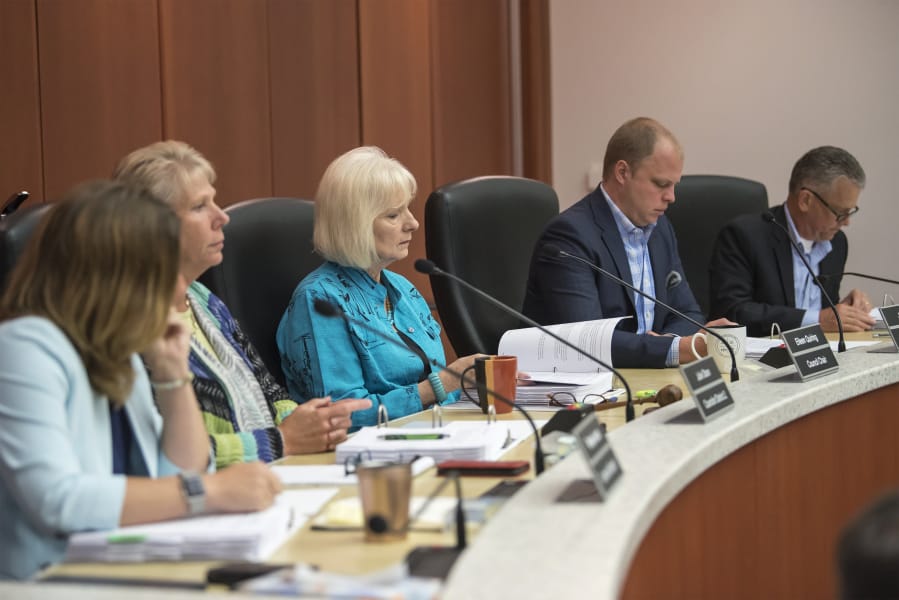The Clark County Board of Health passed a resolution Wednesday declaring racism as a public health crisis in the community.
The resolution is both symbolic and practical. Because the Board of Health has formally acknowledged that systemic racism creates health disparities and inequities for people of color, it will make Clark County Public Health more eligible for grant funding directed at those problems.
The resolution should help build community trust, according to Clark County Public Health Officer Dr. Alan Melnick. Melnick also believes it will help the county hire and retain employees of color.
The president of the Southwest Washington League of United Latin American Citizens Council 47013, Ed Hamilton Rosales, called for an action like this in the summer. Clark County Councilor Temple Lentz first presented the resolution to the board at an October meeting.
Lentz has said the resolution will set parameters the county can use to form policy or re-examine existing policy.
“This is a really important first step,” Lentz said Wednesday. “I don’t think any of us are under the impression that passing this resolution magically changes anything, but what it does is it essentially provides permission to intentionally take on this work.”
Councilors Lentz, John Blom and Julie Olson voted in favor of the resolution. Council Chair Eileen Quiring O’Brien and Councilor Gary Medvigy did not attend the meeting nor vote. Both had expressed skepticism about the nexus of systemic racism and health outcomes in an October council meeting.
In the summer, Quiring O’Brien said she did not believe systemic racism existed in Clark County.
Lentz said the council received dozens of letters from organizations in support of the resolution, including Kaiser Permanente, PeaceHealth, The Vancouver Clinic, Lifeline Connections and Council for the Homeless.
Olson said she has been researching the links between systemic racism and health outcomes. She said the data shows that systemic racism impacts health.
As part of Lentz’s resolution proposal, Clark County Public Health put together a packet of statistics that shows the negative health disparities people of color encounter in Clark County.
For example, Black men are expected to die five years younger (73 years old) than white men (78). Latino people make up close to 30 percent of the county’s COVID-19 cases, but only 10 percent of the county’s population.
“The data is there. The science is there to support this,” Olson said. “We know that systemic racism is a social determinant of health. … I know we’ve made progress toward racial equality and there is evidence to support that that’s making a difference, but we are not there yet.”
Blom, who earned bachelor’s and master’s degrees in history, framed the resolution in the context of American history.
Blom drew the line from slavery to poll taxes and disenfranchisement to Jim Crow segregation to redlining and housing segregation, which severely hampered the ability of Black people to own homes and build wealth.
He said those factors play into the disparate health outcomes in Clark County and the U.S.
“Blacks were traded and sold as property, starting from the 1600s, and that continued for 250 years until the Civil War,” Blom said. “Systemic racism is written into the Constitution with the three-fifths counting of Blacks when it comes to the census and representation. These issues and these systems are older than the country itself.”
COVID-19 update
Also at Wednesday’s meeting, Melnick said coronavirus infection rates continue to rise in Clark County and the surrounding areas.
Last week, Clark County averaged 176 new cases per day, Melnick said. In early October, the county averaged 42 new cases per day.
Melnick said the highest COVID-19 activity has been among people between 25 and 59 years old, but he explained the county is beginning to see higher rates of COVID-19 in people older than 60. Melnick has said for weeks now that younger people will spread the virus to older people. That will lead to more hospitalizations.
On Tuesday, PeaceHealth Southwest Medical Center announced it’s preparing for a 20 to 40 percent increase in COVID-19 patients in the next two to four weeks.
Clark County is devoting nearly 13 percent of its total hospital beds to COVID-19 patients.
Melnick said he’s not concerned about bed space as much as he is concerned about hospital staff.
“The longer this goes on, the higher chance of them getting infected, exhausted, and the cases exceeding the number of staff able to care for them,” Melnick said. “That’s what keeps me up at night.”





